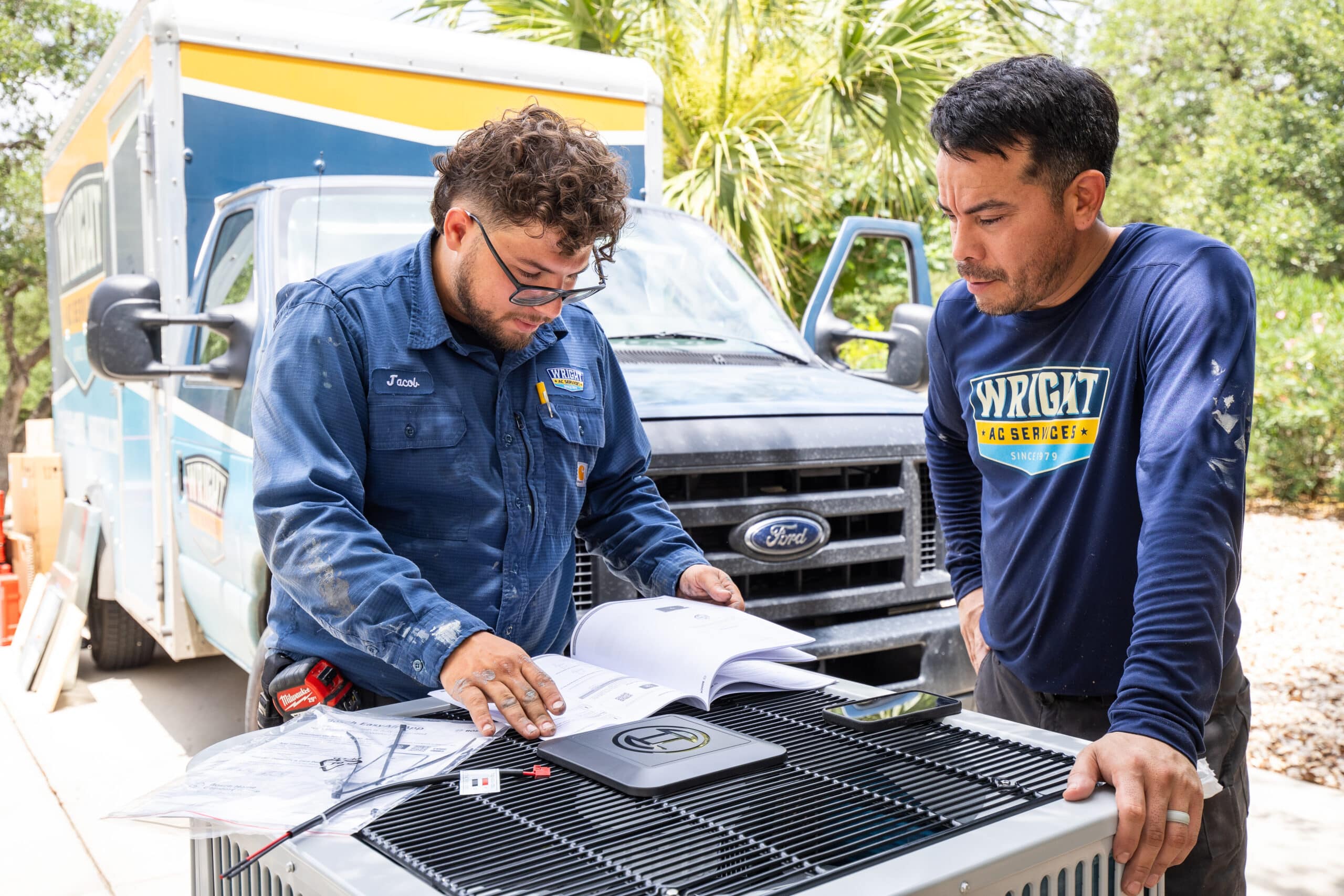In this article…
- What Determines the Quality and Capacity of an HVAC System?
- Why Bigger Isn’t Always Better: Busting The Myth
- How to Choose the Right System for Your Home
- Finding The Right HVAC System For Your Home
When it comes time to replace your air conditioning system, it’s easy to think any unit will work as long as it cools your home…right?
The truth is, not all AC systems are created equal.
From brand and installation quality to proper sizing, many factors impact your home’s comfort, your energy bills, and how long your new system will last, which is why choosing the right system for your home is essential.
Choosing the wrong system doesn’t just create an inconvenience. It can cost you thousands of dollars over the years in high utility bills, frequent repairs, and premature replacement.
At Wright Home Services, we’ve been helping San Antonio homeowners upgrade and maintain their AC units since 1979, providing comfort and education for all.
We’re here to help guide you to the right HVAC solution for you, whether you need a full system replacement or simple repair. Whether you work with us or not, above all else, we want to provide you with all the information you need to make the right choice for your home.
It’s not uncommon for many homeowners to assume that most HVAC systems are created equal, even if they are different brands and sizes. But this isn’t necessarily true.
You want to know what determines the quality of a system, how to choose the right system for your home, and how choosing the wrong system can impact your comfort and your wallet, which is exactly what we’ll explore in this article.
What Determines the Quality and Capacity of an HVAC System?
When searching for the right HVAC system for your home, one of the biggest things you need to understand is what determines the quality of the system, as well as the capacity it can run.
Once you understand these basics, you’ll have the confidence to choose the right size and brand system you need and avoid potentially being taken advantage of by a faulty company.
Here are four things to consider before making this major investment.
1. Build and Brand Quality
Just like any home appliance, not all AC brands are built to the same standards. Premium brands use higher-quality materials, have stricter manufacturing standards, and often offer better warranty coverage.
Economy brands might come with a lower upfront price, but they may cost you more in repairs or inefficiency down the road. That’s why it’s important to weigh long-term reliability over just initial cost.
Read more about how much an HVAC system replacement costs and what factors mos affect the cost!
2. SEER Rating and Efficiency
An air conditioner’s efficiency is measured by its SEER rating (Seasonal Energy Efficiency Ratio). The higher the SEER rating, the more efficiently the system cools your home. This means lower energy bills and a reduced environmental impact.
Modern systems typically range from 14 SEER to 20+ SEER, and while higher SEER systems cost more upfront, the savings in electricity often pay off within a few years.
The right SEER rating for your new system mostly depends on the size of your home and your comfort goals.
3. Size and Capacity (Tonnage)
Capacity is measured in “tons,” but this doesn’t refer to the unit’s weight. Tonnage indicates how much heat the system can remove from your home in an hour.
Proper sizing ensures your system runs efficiently and keeps you comfortable. A system that’s too small will run constantly without cooling your home effectively, while an oversized system creates other issues we’ll cover shortly.
It’s true that bigger doesn’t always mean better when it comes to the tonnage of a system, which we’ll explore in the next section of this article.
4. Installation Quality
Even the best AC system will underperform if it isn’t installed properly. A poor installation can lead to refrigerant leaks, improper airflow, and reduced efficiency.
Choosing a licensed, experienced HVAC professional ensures your system is installed to manufacturer specifications and local code, protecting your investment and your comfort.
All of these four main factors will impact what type and size of system you need for your home and which system will meet your needs for comfort and efficiency.
Why Bigger Isn’t Always Better: Busting The Myth
Many homeowners assume that getting the largest system possible will cool their home faster and better. Unfortunately, this is one of the biggest mistakes people make when replacing their AC.
Oversized units cool your home too quickly, causing what’s called “short cycling.” This means the system turns on and off frequently, which:
- Uses more electricity
- Causes excessive wear and tear on system components
- Leads to uneven cooling, with hot and cold spots throughout your home
Another consequence of an oversized system is poor humidity control. Because the unit cools your home so quickly, it doesn’t run long enough to remove humidity from the air.
You may feel clammy or uncomfortable even though the thermostat says the temperature is cool.
So, what should you consider to find the right-sized system for your home?
The only way to know the proper size for your AC system is to have a professional, thorough inspection of your home. During this inspection, a professional HVAC technician will look at:
- Your home’s square footage
- Ceiling height
- Insulation quality
- Number and type of windows
- Sun exposure
- Ductwork layout and condition
Each of these factors will allow the technician to properly calculate what size system is right for your home, because not every home is created equal, even if square footage is the same.
At Wright Home Services, we perform this calculation before every replacement to ensure you get a system sized perfectly for your home and comfort. Schedule your free estimate today!
How to Choose the Right System for Your Home
After understanding what technical factors to consider when choosing a new HVAC system for your home, it’s time to take action to really determine what system type will be best for you.
Here are five easy steps to follow to find the right HVAC system.
Step 1: Assess Your Home’s Needs
Consider your home’s age, insulation levels, and the condition of your ductwork.
If your ducts are leaky or undersized, even the best AC unit won’t perform efficiently, and you may need duct repair or full ductwork replacement.
An honest HVAC company will inspect all of these factors before quoting your replacement options.
Step 2: Compare Brands and Models
Brand reputation matters. Established, high-quality brands often have better parts availability for repairs down the road and uphold their warranty commitments.
Cheaper brands (or HVAC companies) may leave you waiting for parts or force you into premature replacement if something major fails.
Step 3: Think Beyond the Unit
Your AC system is just one part of your home’s overall comfort solution. You may also want to consider indoor air quality upgrades like UV lights or a whole-home air purification system to reduce allergens and bacteria.
A smart thermostat is also a common upgrade to maximize efficiency and savings, and add some efficient high-tech to your home.
Step 4: Consider Rebates, Incentives, and Financing
Many utility companies and manufacturers offer rebates for installing high-efficiency systems, and these incentives can significantly offset your upfront costs.
Financing options are also available to make premium systems more accessible, allowing you to prioritize long-term savings and comfort without compromising your budget.
These options allow you to consider a higher-efficiency system to provide you with longer, better comfort.
Step 5: Schedule a Professional Consultation
Finally, the best way to find the right HVAC system for your home is to schedule a consultation with a trusted HVAC professional.
Replacing your AC is a large investment, which means making the right choice in system type and who you work with is crucial.
You want to work with an HVAC professional who takes time to evaluate your home, discuss your goals, and educate you on options rather than just quoting the cheapest replacement.
Finding The Right HVAC System For Your Home
Now you know four crucial elements to determine what size and capacity HVAC unit you need and some easy steps to follow when shopping for a new system and have a baseline knowledge on how to find the right system for your home.
Choosing the right AC system for your home is about much more than picking a brand and tonnage. It’s about ensuring your investment keeps your home comfortable, your energy bills low, and your family healthy for years to come.
When determining the right unit for your home, you must look at the build and brand quality, SEER rating, efficiency, size and capacity, and the installation quality. This will help you narrow down your options to a brand or size type and help you to find a trustworthy HVAC company to work with.
Once you understand how each of these factors affects the quality and efficiency of your new system, you can
- Assess your home’s needs
- Compare brands and HVAC companies
- Consider your ductwork or IAQ needs
- Schedule your professional consultation
Having an idea of what system type is best for you will help ensure you work with a company you can trust and won’t take advantage of you. The more knowledge you have, the more equipped you are to make the right choice.
At Wright Home Services, we believe every homeowner deserves a system that’s perfectly designed for their needs.
We know that every home is unique, and there’s never just one cookie-cutter option for all homes. That’s why our expert technicians will assess your current system, ductwork, and your home’s layout to recommend the best comfort solution.
If you’re considering replacing your HVAC system, one of the first things you want to know is how much it’s going to cost. We’re here to help.
Check out this article that details the average cost to replace your HVAC system and what factors most affect that cost, so you can have realistic expectations for the cost of your project and be prepared for your professional consultation.


